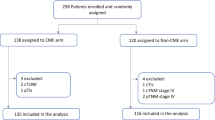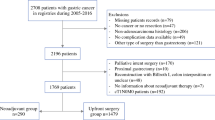Abstract
Background
The correct extent of mesocolic dissection for right-sided colon cancer (RCC) is still under debate. Complete mesocolic excision (CME) has not gained wide diffusion, mainly due to its technical complexity and unclear oncological superiority. This study aims to evaluate oncological outcomes of CME compared with non-complete mesocolic excision (NCME) during resection for I–III stage RCC.
Method
Prospectively collected data of patients who underwent surgery between 2010 and 2018 were retrospectively analysed. 1:1 Propensity score matching (PSM) was used to balance baseline characteristics of CME and NCME patients. The primary endpoint of the study was local recurrence-free survival (LRFS). The two groups were also compared in terms of short-term outcomes, distant recurrence-free survival, disease-free survival, and overall survival.
Results
Of the 444 patients included in the study, 292 were correctly matched after PSM, 146 in each group. The median follow-up was 45 months (IQR 33–63). Conversion rate, complications, and 90-day mortality were comparable in both groups. The median number of lymph nodes harvested was higher in CME patients (23 vs 19, p = 0.034). 3-year LRFS rates for CME patients was 100% and 95.6% for NCME (log-rank p = 0.028). At 3 years, there were no differences between the groups in terms of overall survival, distant recurrence-free survival, and disease-free survival.
Conclusion
Our PSM cohort study shows that CME is safe, provides a higher number of lymph nodes harvested, and is associated with better local recurrence-free survival.

Similar content being viewed by others
References
Enker WE, Kafka NJ, Martz J (2000) Planes of sharp pelvic dissection for primary, locally advanced, or recurrent rectal cancer. Semin Surg Oncol 18:199–206
Wibe A, Møller B, Norstein J, Carlsen E, Wiig JN, Heald RJ et al (2002) A National strategic change in treatment policy for rectal cancer—implementation of total mesorectal excision as routine treatment in Norway. A national audit. Dis Colon Rectum 45:857–866. https://doi.org/10.1007/s10350-004-6317-7
Heald RJ, Husband EM, Ryall RD (1982) The mesorectum in rectal cancer surgery—the clue to pelvic recurrence? Br J Surg 69:613–616
Hohenberger W, Weber K, Matzel K, Papadopoulos T, Merkel S (2009) Standardized surgery for colonic cancer: complete mesocolic excision and central ligation—technical notes and outcome. Colorectal Dis 11:354–364. https://doi.org/10.1111/j.1463-1318.2008.01735.x
Heald RJ (1988) The “Holy Plane” of rectal surgery. J R Soc Med 81:503–508
Killeen S, Mannion M, Devaney A, Winter DC (2014) Complete mesocolic resection and extended lymphadenectomy for colon cancer: a systematic review. Colorectal Dis 16:577–594
Jamali FR, Soweid AM, Dimassi H, Bailey C, Leroy J, Marescaux J (2008) Evaluating the degree of difficulty of laparoscopic colorectal surgery. Arch Surg 143:762–767 (discussion 768)
Kim IY, Kim BR, Choi EH, Kim YW (2016) Short-term and oncologic outcomes of laparoscopic and open complete mesocolic excision and central ligation. Int J Surg 27:151–157. https://doi.org/10.1016/j.ijsu.2016.02.001
Emmanuel A, Haji A (2016) Complete mesocolic excision and extended (D3) lymphadenectomy for colonic cancer: is it worth that extra effort? A review of the literature. Int J Colorectal Dis 31:797–804. https://doi.org/10.1007/s00384-016-2502-0
Kontovounisios C, Kinross J, Tan E, Brown G, Rasheed S, Tekkis P (2015) Complete mesocolic excision in colorectal cancer: a systematic review. Colorectal Dis 17:7–16. https://doi.org/10.1111/codi.12793
Ouyang M, Luo Z, Wu J, Zhang W, Tang S, Lu Y et al (2019) Comparison of outcomes of complete mesocolic excision with conventional radical resection performed by laparoscopic approach for right colon cancer. Cancer Manag Res 11:8647–8656. https://doi.org/10.2147/CMAR.S203150
Zurleni T, Cassiano A, Gjoni E, Ballabio A, Serio G, Marzoli L et al (2018) Surgical and oncological outcomes after complete mesocolic excision in right-sided colon cancer compared with conventional surgery: a retrospective, single-institution study. Int J Colorectal Dis 33:1–8
Magistro C, Bertoglio CL, Giani A, Mazzola M, Rubicondo C, Maspero M et al (2021) Laparoscopic complete mesocolic excision versus conventional resection for right-sided colon cancer: a propensity score matching analysis of short-term outcomes. Surg Endosc. https://doi.org/10.1007/s00464-021-08601-z
Magistro C, Di Lernia S, Ferrari G, Zullino A, Mazzola M, De Martini P et al (2013) Totally laparoscopic versus laparoscopic-assisted right colectomy for colon cancer: is there any advantage in short-term outcomes? A prospective comparative assessment in our center. Surg Endosc 27:2613–2618. https://doi.org/10.1007/s00464-013-2799-5
von Elm E, Altman DG, Egger M, Pocock SJ, Gøtzsche PC, Vandenbroucke JP et al (2007) The Strengthening the Reporting of Observational Studies in Epidemiology (STROBE) statement: guidelines for reporting observational studies. Prev Med 45:247–251. https://doi.org/10.1016/j.ypmed.2007.08.012
Charlson ME, Pompei P, Ales KL, Ronald MC (1987) A new method of classifying prognostic comorbidity in longitudinal studies: development and validation. J Chronic Dis 40:373–383. https://doi.org/10.1016/0021-9681(87)90171-8
Institute NC, National Cancer Institute (2020) AJCC cancer staging manual 8th edition. Definitions. https://doi.org/10.32388/b30ldk
Dindo D, Demartines N, Clavien P-A (2004) Classification of surgical complications. Ann Surg 240:205–213. https://doi.org/10.1097/01.sla.0000133083.54934.ae
Austin PC (2011) An introduction to propensity score methods for reducing the effects of confounding in observational studies. Multivar Behav Res 46:399–424. https://doi.org/10.1080/00273171.2011.568786
Xu W, He Y, Wang Y, Li X, Young J, Ioannidis JPA et al (2020) Risk factors and risk prediction models for colorectal cancer metastasis and recurrence: an umbrella review of systematic reviews and meta-analyses of observational studies. BMC Med 18:172. https://doi.org/10.1186/s12916-020-01618-6
Chen P-J, Li T-L, Sun T-T, Willis VC, Christopher Roebuck M, Bravata DM et al (2020) Clinical decision support for high-risk stage II colon cancer: a real-world study of treatment concordance and survival. Dis Colon Rectum 63:1383–1392. https://doi.org/10.1097/dcr.0000000000001690
Bertelsen CA, Neuenschwander AU, Jansen JE, Wilhelmsen M, Kirkegaard-Klitbo A, Tenma JR et al (2015) Disease-free survival after complete mesocolic excision compared with conventional colon cancer surgery: a retrospective, population-based study. Lancet Oncol 16:161–168
Bertelsen CA, Neuenschwander AU, Jansen JE, Tenma JR, Wilhelmsen M, Kirkegaard-Klitbo A et al (2019) 5-year outcome after complete mesocolic excision for right-sided colon cancer: a population-based cohort study. Lancet Oncol 20:1556–1565. https://doi.org/10.1016/S1470-2045(19)30485-1
An MS, Baik H, Oh SH, Park Y-H, Seo SH, Kim KH et al (2018) Oncological outcomes of complete versus conventional mesocolic excision in laparoscopic right hemicolectomy. ANZ J Surg 88:E698-702. https://doi.org/10.1111/ans.14493
Ow ZGW, Sim W, Nistala KRY, Ng CH, Koh FH-X, Wong NW et al (2020) Comparing complete mesocolic excision versus conventional colectomy for colon cancer: a systematic review and meta-analysis. Eur J Surg Oncol. https://doi.org/10.1016/j.ejso.2020.09.007
Lu J-Y, Xu L, Xue H-D, Zhou W-X, Xu T, Qiu H-Z et al (2016) The Radical Extent of lymphadenectomy—D2 dissection versus complete mesocolic excision of LAparoscopic Right Colectomy for right-sided colon cancer (RELARC) trial: study protocol for a randomized controlled trial. Trials 17:582. https://doi.org/10.1186/s13063-016-1710-9
Karachun A, Petrov A, Panaiotti L, Voschinin Y, Ovchinnikova T (2019) Protocol for a multicentre randomized clinical trial comparing oncological outcomes of D2 D3 lymph node dissection in colonic cancer (COLD trial). BJS Open 3:288–298. https://doi.org/10.1002/bjs5.50142
Shiozawa M, Ueno H, Shiomi A, Kim NK, Kim JC, Tsarkov P et al (2021) Study protocol for an international prospective observational cohort study for optimal bowel resection extent and central radicality for colon cancer (T-REX study). Jpn J Clin Oncol 51:145–155. https://doi.org/10.1093/jjco/hyaa115
Bertelsen CA, Bols B, Ingeholm P, Jansen JE, Neuenschwander AU, Vilandt J (2011) Can the quality of colonic surgery be improved by standardization of surgical technique with complete mesocolic excision? Colorectal Dis 13:1123–1129. https://doi.org/10.1111/j.1463-1318.2010.02474.x
Kobayashi H, West NP, Takahashi K, Perrakis A, Weber K, Hohenberger W et al (2014) Quality of surgery for stage III colon cancer: comparison between England, Germany, and Japan. Ann Surg Oncol 21:398–404. https://doi.org/10.1245/s10434-014-3578-9
West NP, Hohenberger W, Weber K, Perrakis A, Finan PJ, Quirke P (2010) Complete mesocolic excision with central vascular ligation produces an oncologically superior specimen compared with standard surgery for carcinoma of the colon. J Clin Oncol 28:272–278. https://doi.org/10.1200/jco.2009.24.1448
Kotake K, Honjo S, Sugihara K, Hashiguchi Y, Kato T, Kodaira S et al (2012) Number of lymph nodes retrieved is an important determinant of survival of patients with stage II and stage III colorectal cancer. Jpn J Clin Oncol 42:29–35. https://doi.org/10.1093/jjco/hyr164
Ovrebo K, Rokke O (2010) Extended lymph node dissection in colorectal cancer surgery. Reliability and reproducibility in assessments of operative reports. Int J Colorectal Dis 25:213–222
Sjo OH, Merok MA, Svindland A, Nesbakken A (2012) Prognostic impact of lymph node harvest and lymph node ratio in patients with colon cancer. Dis Colon Rectum 55:307–315. https://doi.org/10.1097/DCR.0b013e3182423f62
Rosenberg R, Hoos A, Mueller J, Baier P, Stricker D, Werner M et al (2002) Prognostic significance of cytokeratin-20 reverse transcriptase polymerase chain reaction in lymph nodes of node-negative colorectal cancer patients. J Clin Oncol 20:1049–1055. https://doi.org/10.1200/JCO.2002.20.4.1049
Rahbari NN, Bork U, Motschall E, Thorlund K, Büchler MW, Koch M et al (2012) Molecular detection of tumor cells in regional lymph nodes is associated with disease recurrence and poor survival in node-negative colorectal cancer: a systematic review and meta-analysis. J Clin Oncol 30:60–70. https://doi.org/10.1200/JCO.2011.36.9504
Kanemitsu Y, Komori K, Kimura K, Kato T (2013) D3 lymph node dissection in right hemicolectomy with a no-touch isolation technique in patients with colon cancer. Dis Colon Rectum 56:815–824. https://doi.org/10.1097/DCR.0b013e3182919093
Kawada H, Kurita N, Nakamura F, Kawamura J, Hasegawa S, Kotake K et al (2014) Incorporation of apical lymph node status into the seventh edition of the TNM classification improves prediction of prognosis in stage III colonic cancer. Br J Surg 101:1143–1152. https://doi.org/10.1002/bjs.9548
Bertelsen CA, Kirkegaard-Klitbo A, Nielsen M, Leotta SMG, Daisuke F, Gögenur I (2016) Pattern of colon cancer lymph node metastases in patients undergoing central mesocolic lymph node excision: a systematic review. Dis Colon Rectum 59:1209–1221. https://doi.org/10.1097/DCR.0000000000000658
Liang J-T, Lai H-S, Huang J, Sun C-T (2015) Long-term oncologic results of laparoscopic D3 lymphadenectomy with complete mesocolic excision for right-sided colon cancer with clinically positive lymph nodes. Surg Endosc 29:2394–2401. https://doi.org/10.1007/s00464-014-3940-9
Lan Y-T, Lin J-K, Jiang J-K, Chang S-C, Liang W-Y, Yang S-H (2011) Significance of lymph node retrieval from the terminal ileum for patients with cecal and ascending colonic cancers. Ann Surg Oncol 18:146–152. https://doi.org/10.1245/s10434-010-1270-2
Voyer TEL, Le Voyer TE, Sigurdson ER, Hanlon AL, Mayer RJ, Macdonald JS et al (2003) Colon cancer survival is associated with increasing number of lymph nodes analyzed: a secondary survey of intergroup trial INT-0089. J Clin Oncol 21:2912–2919. https://doi.org/10.1200/jco.2003.05.062
Liska D, Stocchi L, Karagkounis G, Elagili F, Dietz DW, Kalady MF et al (2017) Incidence, patterns, and predictors of locoregional recurrence in colon cancer. Ann Surg Oncol 24:1093–1099. https://doi.org/10.1245/s10434-016-5643-z
Gao Z, Wang C, Cui Y, Shen Z, Jiang K, Shen D et al (2020) Efficacy and safety of complete mesocolic excision in patients with colon cancer: three-year results from a prospective, nonrandomized, double-blind, controlled trial. Ann Surg 271:519–526. https://doi.org/10.1097/SLA.0000000000003012
Freund MR, Edden Y, Reissman P, Dagan A (2016) Iatrogenic superior mesenteric vein injury: the perils of high ligation. Int J Colorectal Dis 31:1649–1651. https://doi.org/10.1007/s00384-016-2624-4
Bertelsen CA (2017) Complete mesocolic excision an assessment of feasibility and outcome. Dan Med J 64
Dai Q, Tu S, Dong Q, Chen B (2020) Laparoscopic complete mesocolic excision versus noncomplete mesocolic excision: a systematic review and meta-analysis. Surg Laparosc Endosc Percutan Tech. https://doi.org/10.1097/SLE.0000000000000845
Guyatt GH, Oxman AD, Vist GE, Kunz R, Falck-Ytter Y, Alonso-Coello P et al (2008) GRADE: an emerging consensus on rating quality of evidence and strength of recommendations. BMJ 336(7650):924–926. https://doi.org/10.1136/bmj.39489.470347.AD
Funding
The authors received no specific funding for this work.
Author information
Authors and Affiliations
Corresponding author
Ethics declarations
Disclosures
Drs. Alessandro Giani, Camillo Leonardo Bertoglio, Michele Mazzola, Irene Giusti, Pietro Achilli, Pietro Carnevali, Matteo Origi, Carmelo Magistro, and Giovanni Ferrari have no conflict of interest or financial ties to disclose.
Additional information
Publisher's Note
Springer Nature remains neutral with regard to jurisdictional claims in published maps and institutional affiliations.
Rights and permissions
About this article
Cite this article
Giani, A., Bertoglio, C.L., Mazzola, M. et al. Mid-term oncological outcomes after complete versus conventional mesocolic excision for right-sided colon cancer: a propensity score matching analysis. Surg Endosc 36, 6489–6496 (2022). https://doi.org/10.1007/s00464-021-09001-z
Received:
Accepted:
Published:
Issue Date:
DOI: https://doi.org/10.1007/s00464-021-09001-z




